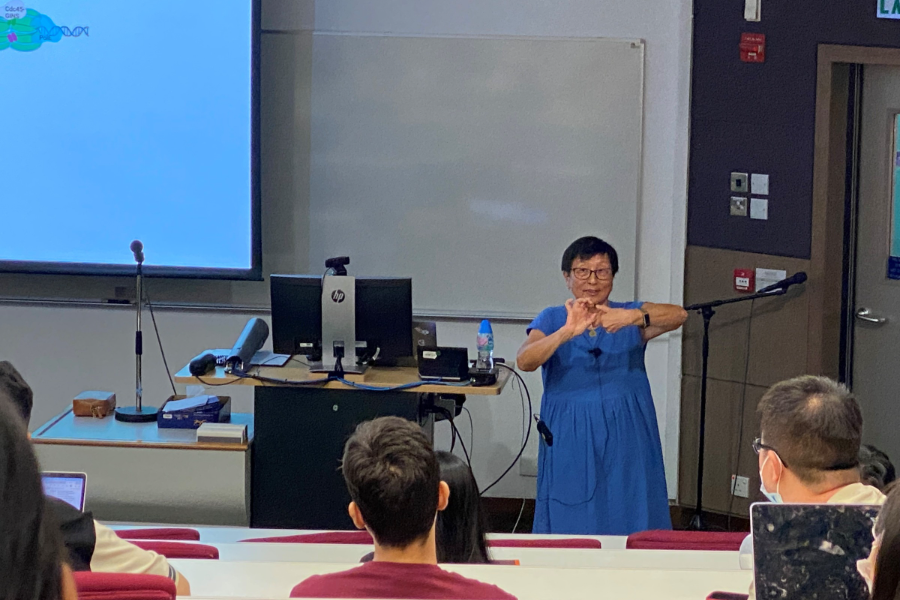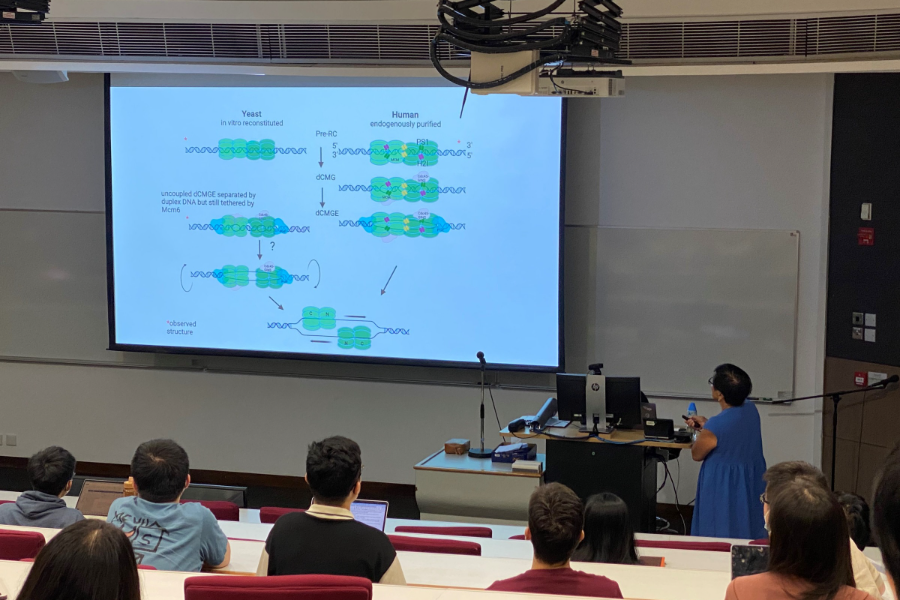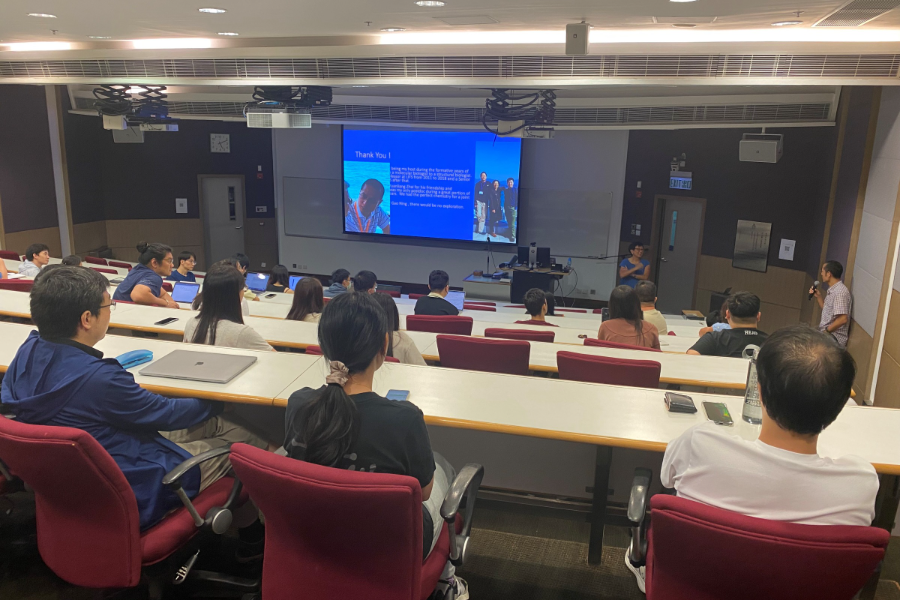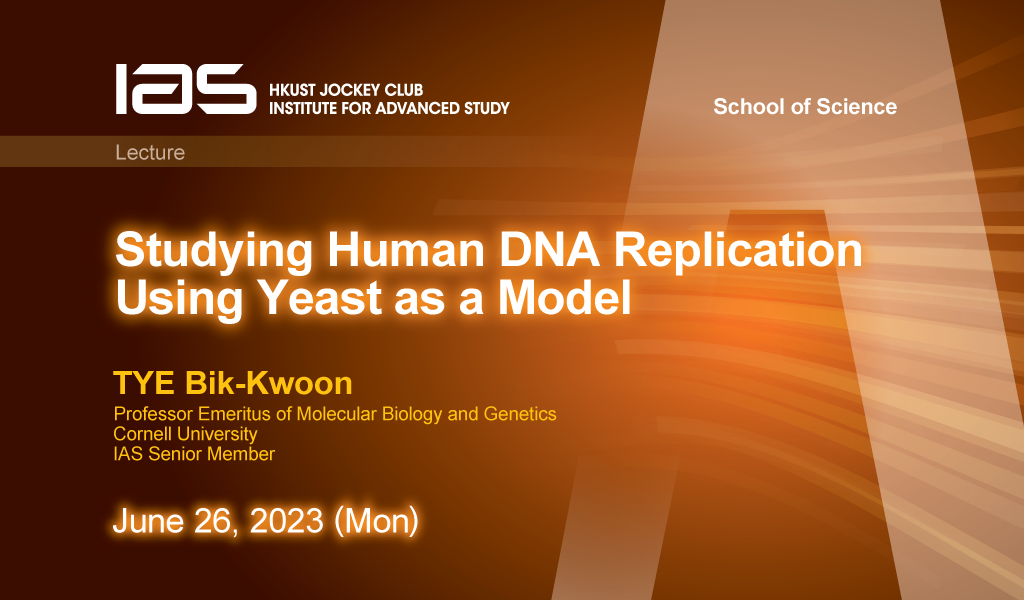Studying Human DNA Replication Using Yeast as a Model
Abstract
The DNA replication mechanism is highly conserved in eukaryotes yet must adapt to the diverse lifestyles of the myriads of species within the kingdom. The speaker will discuss three specific DNA replication complexes, the origin recognition complex, ORC [1, 2], the yeast and human prereplication complex, pre-RC [3, 4], and the MCM double hexamer bound by its activator, the Dbf4-Cdc7 kinase [5], as examples of how the DNA replication machinery evolves to adapt to the very different life cycles adopted by yeast and human.
References:
[1] Li, N, Lam WH, Zhai Y, Cheng J, Zhao Y, Gao, N and Tye, BK. Nature 559:217-222 (2018) Structure of the Origin Recognition Complex Bound to DNA Replication Origin
[2] Lee CSK, Cheung MF, Li J, Zhao Y, Lam WH, Ho V, Rohs R, Zhai Y, Leung D, Tye BK. Nat Commun 12:33 (2021) Humanizing the Yeast Origin Recognition Complex.
[3] Li, N., Zhai, Y, Zhang Y., Li, W., Yang, M., Lei, J., Tye, BK, Gao, N. Nature 524:186-91. (2015) Structure of the Eukaryotic Minichromosome Maintenance Complex at 3.8Å.
[4] Li J, Dong J, Wang W, Yu D, Fan X, Hui YC, Lee CSK, Lam WH, Alary N, Yang Y, Zhang Y, Zhao Q, Chen CL, Tye BK, Dang S, Zhai Y. Cell 186:1, 98-111(2023) The human prereplication complex is an open complex.
[5] Cheng J, Li N, Huo Y, Dang S, Tye BK, Gao N, Zhai Y. Nat Commun 13:1396 (2022) Structural Insight into the MCM Double Hexamer Activation by Dbf4-Cdc7 Kinase
About the Speaker
Prof. Tye Bik-Kwoon obtained her PhD from Massachusetts Institute of Technology in 1974. She was a Helen Hay Whitney Fellow at Stanford University School of Medicine prior to joining the faculty of Cornell University in 1977. Prof. Tye served on the Cornell faculty as assistant, associate, and full professor until her retirement in 2015. She joined HKUST as a Visiting Professor of the Division of Life Science in 2013. She is now the Professor Emeritus of Molecular Biology and Genetics at Cornell University. She is also a Senior Member at the HKUST Jockey Club Institute for Advanced Study.
Prof. Tye’s research focuses on the structures and functions of the eukaryotic DNA replication machinery. She is a world leader in the subject of DNA replication, the process of producing two identical replicas of DNA from one original DNA molecule. DNA replication takes place in all living things and is the basis for biological inheritance: when cells divide the parent and daughter cells each retain a copy of the original DNA molecule. This replication process is extraordinarily complex, and while much of the molecular machinery involved has been identified, many of the details of the replication process are poorly understood. In 1984, Prof. Tye’s laboratory discovered an important protein complex, mini-chromosome maintenance (MCM), involved in replication of DNA in fungi, plants, and humans.
After joining the HKUST faculty, Prof. Tye has continued to investigate the molecular mechanisms of DNA replication. She has been one of the pioneers employing cryogenic electron microscopy (cryoEM) to image the implicated molecules. Her first major result as an HKUST faculty member determined the structure of the MCM complex, work published in Nature in 2015 and highlighted in Nature ‘News and Views’, showing that MCM is the key protein for DNA replication. Recently she and her collaborators at HKUST and Peking University have made a major breakthrough in the high-resolution imaging of another important component in the replication process, the Origin Recognition Complex (ORC), also reported in Nature.
Prof. Tye is an expert in the use of cryoEM in the imaging of biological molecules. The importance of this relatively new technique in biological research is hard to overemphasize - as part of the so-called “resolution revolution” in biology in 2013, the invention of cryoEM was recognized with the 2017 Nobel prize in Chemistry. In 2023, she was elected to the Member of the US National Academy of Sciences.
For Attendees' Attention
Seating is on a first come, first served basis.






